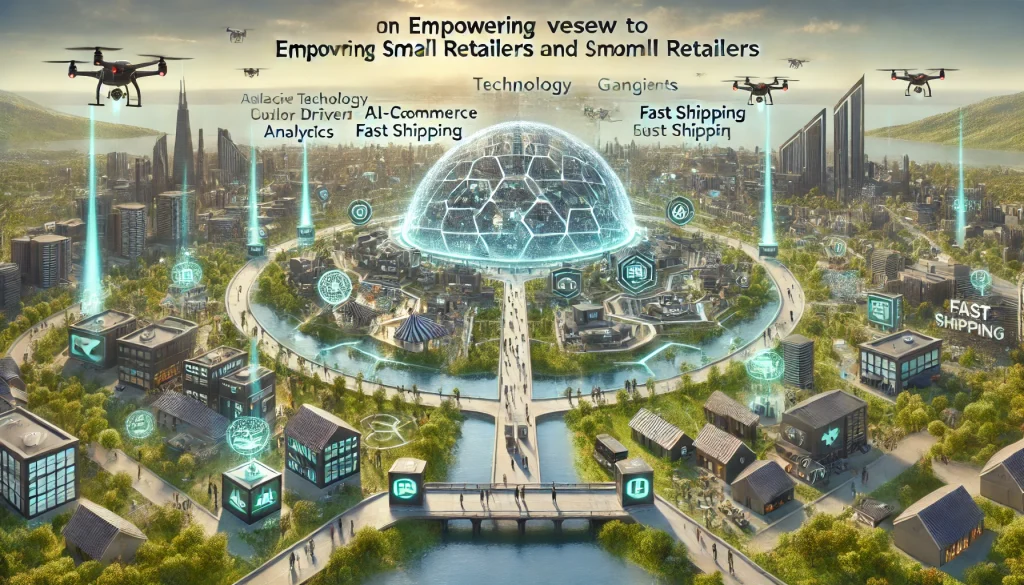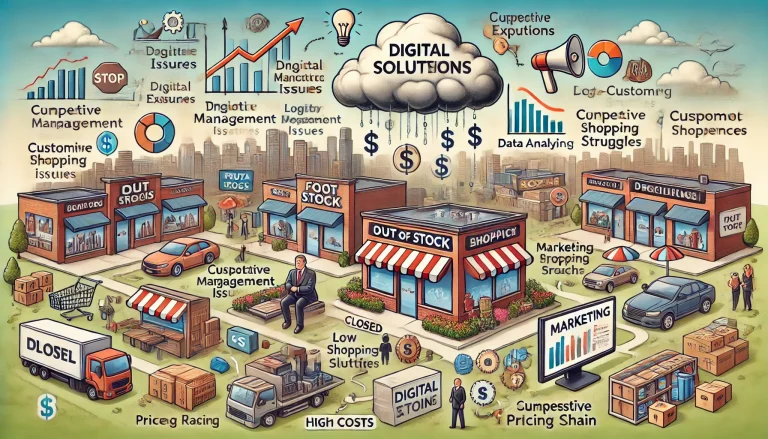Problem Statement
Businesses face intense competition from online giants and marketplaces like Amazon, which dominate the e-commerce landscape. These platforms offer extensive product selections, competitive pricing, and fast shipping, creating significant challenges for smaller retailers. To survive and thrive, businesses must differentiate themselves by offering unique value propositions and building strong customer relationships. Smaller retailers struggle with limited resources, less brand recognition, and less sophisticated logistics networks compared to these online giants. Consequently, it becomes crucial for them to find innovative ways to stand out and meet the evolving demands of consumers who have become accustomed to the convenience and variety provided by large e-commerce players.
Pain Points
- Limited Product Selection: Smaller retailers often cannot match the extensive product range offered by giants like Amazon, leading to reduced customer attraction.
- Pricing Competitiveness: Competing with the low prices offered by large e-commerce platforms can be difficult due to economies of scale enjoyed by giants.
- Shipping Efficiency: Fast and free shipping options provided by large players set high consumer expectations, challenging smaller businesses to match these standards.
- Brand Recognition: Lesser-known brands struggle to build visibility and trust compared to established giants.
- Technology Integration: Smaller retailers may lack the advanced technology and infrastructure to provide seamless online shopping experiences.
- Customer Data Analytics: Large platforms use sophisticated analytics to understand consumer behavior, giving them a competitive edge in personalization.
- Marketing Reach: Limited marketing budgets restrict smaller retailers from reaching a broader audience.
- Supply Chain Optimization: Efficient supply chain management is more challenging for smaller retailers with limited resources.
- Customer Loyalty: Building and maintaining customer loyalty is difficult when consumers are drawn to the convenience and perks offered by giants.
- Resource Constraints: Smaller businesses often operate with fewer resources, affecting their ability to innovate and scale.

Future Vision
To compete effectively, smaller retailers need to leverage technology, focus on niche markets, and emphasize customer experience. The future vision includes developing personalized shopping experiences through advanced data analytics and AI, ensuring efficient logistics with smart supply chain management, and building strong brand identities through unique value propositions. Retailers can also benefit from collaborative platforms that offer shared resources and technologies, reducing operational costs and increasing competitive advantage. Sustainability initiatives and ethical practices can further differentiate smaller businesses, attracting conscious consumers. By investing in customer relationship management (CRM) systems, retailers can enhance customer loyalty and satisfaction. Ultimately, smaller retailers will thrive by being agile, innovative, and customer-centric, leveraging their unique strengths to create lasting value.
Use Cases
- Personalized Shopping Experiences: Utilizing AI to offer tailored product recommendations based on customer preferences and behavior.
- Efficient Logistics: Implementing smart supply chain solutions to ensure fast and cost-effective shipping.
- Brand Building: Creating strong brand identities through unique product offerings and exceptional customer service.
- Collaborative Platforms: Sharing resources and technologies with other small retailers to reduce costs and improve services.
- Sustainability Initiatives: Adopting eco-friendly practices to attract environmentally conscious consumers.
- Customer Relationship Management: Using CRM systems to build and maintain strong customer relationships.
- Niche Market Focus: Specializing in specific market segments to attract dedicated customer bases.
- Enhanced Marketing Strategies: Leveraging digital marketing and social media to increase visibility and engagement.
- Omni-channel Integration: Providing seamless shopping experiences across online and offline channels.
- Data-Driven Insights: Utilizing analytics to gain insights into customer behavior and optimize business strategies.
Target Users and Stakeholders
- Target Users: Small to medium-sized retail business owners, e-commerce managers, marketing managers, supply chain managers.
- Stakeholders:
- Internal: Employees (IT, marketing, supply chain, customer service), management, shareholders.
- External: Customers, suppliers, logistics partners, technology vendors, regulatory bodies.
Key Competition
- Amazon
- Description: The largest e-commerce platform offering a vast product range and fast shipping.
- eBay
- Description: An online marketplace for buying and selling a wide variety of goods.
- Walmart
- Description: A retail giant with a growing e-commerce presence.
- Alibaba
- Description: A global e-commerce leader with extensive B2B and B2C operations.
- Etsy
- Description: A marketplace focused on handmade and vintage items.
- Shopify
- Description: Provides e-commerce solutions for businesses of all sizes.
- Wayfair
- Description: Specializes in home goods and furniture e-commerce.
- Rakuten
- Description: A major Japanese e-commerce platform with global reach.
- Zalando
- Description: A leading fashion and lifestyle e-commerce company in Europe.
- Overstock
- Description: An online retailer offering a variety of products at discounted prices.
Active Startups
- Gorgias : Provides a customer service platform specifically designed for e-commerce stores, helping businesses manage customer support across multiple channels.
2. Shippo : Offers a multi-carrier shipping software that simplifies shipping processes for e-commerce businesses, providing access to discounted rates and streamlined logistics.
3. Loop Returns : Focuses on optimizing the returns process for e-commerce stores, enhancing customer experience and reducing operational costs.
Ongoing Work in Related Areas
- AI and Machine Learning: Enhancing personalized shopping experiences and improving supply chain efficiency.
- Blockchain Technology: Providing transparent and secure transaction processes to build trust and traceability.
- Sustainability Practices: Developing eco-friendly packaging and logistics solutions to attract conscious consumers.
- Augmented Reality (AR): Improving online shopping experiences through virtual try-ons and interactive product visualizations.
Recent Investment
- Gorgias: Raised $25M in Series B funding in 2020, led by Sapphire Ventures, to expand its customer service platform for e-commerce.
- Shippo: Secured $45M in Series D funding in 2021, led by D1 Capital Partners, to enhance its shipping solutions.
- Loop Returns: Obtained $65M in Series C funding in 2022, led by Renegade Partners, to scale its returns optimization platform.
Market Maturity
The market for e-commerce solutions is highly mature, with established players like Shopify and Magento offering robust platforms that cater to a wide range of business needs. The demand for innovative solutions continues to grow as businesses seek to differentiate themselves in a competitive landscape dominated by giants like Amazon. The integration of AI, blockchain, and AR technologies is transforming the e-commerce sector, providing advanced capabilities for personalization, security, and customer engagement. Startups are also contributing significantly by addressing specific pain points such as customer service, shipping, and returns management. The market’s maturity is evident in the substantial investments flowing into both established companies and innovative startups, reflecting a strong confidence in the continued growth and evolution of e-commerce solutions.
Summary
The e-commerce landscape is dominated by giants like Amazon, posing significant challenges for smaller retailers. To compete effectively, businesses must differentiate themselves through unique value propositions, personalized shopping experiences, and strong customer relationships. Pain points include limited product selection, pricing competitiveness, shipping efficiency, brand recognition, technology integration, customer data analytics, marketing reach, supply chain optimization, customer loyalty, and resource constraints. The proposed platform aims to address these challenges by leveraging AI, advanced analytics, and collaborative platforms. Competitors like Shopify, BigCommerce, and Magento offer comprehensive e-commerce solutions, while startups such as Gorgias, Shippo, and Loop Returns focus on specific aspects of the e-commerce experience. Ongoing work in AI, blockchain, and AR, along with significant investments in innovative solutions, indicates a highly mature and evolving market. By adopting these strategies and technologies, smaller retailers can effectively compete and thrive in a market dominated by large e-commerce players.



